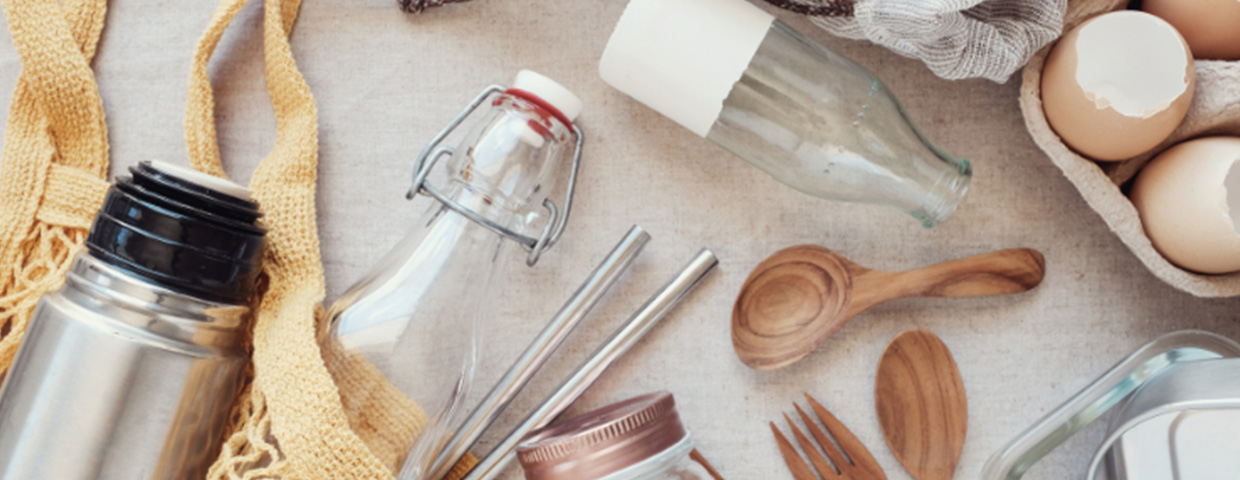
Making Eco Friendly swaps easy
Plastic is a versatile material that is in our appliances, computers, clothing, and so much more. Some of the most common places we find plastic is wrapped around the things that we buy every day. After all, it is an effective way to keep food clean and products fresh.
Plastic is also lurking in some little unknown places. When you take a careful look around your home, the sheer number of things you’ll find containing plastic may surprise you such as;
Here are 20 easy swaps that you can make to eliminate the use of plastics in your life and the environment
Shopping
Plastic shopping bags: Reusable cotton bags
Single-use produce bags: Reusable produce bags or leave your produce loose.
Items packed in plastic: When possible, opt for unpackaged or choose a product that doesn’t contain individually wrapped items.
Eating Out
Disposable cups: Dine in or takeaway in stainless steel or glass reusable cups.
Disposable cutlery: Bring your own set that can be stored, washed and reused.
Disposable straws: Reusable straws in glass, stainless steel, bamboo, or silicone.
Plastic lunch baggies: Reusable lunch box or beeswax wraps
In the Kitchen
Food storage containers and bags: Silicone bags, metal or glass containers.
Liquid soap: Use a powder for the dishwasher and a bar for handwashing.
Cleaners in plastic bottles: Make your own cleaners with ingredients packaged in glass, metal, or cardboard. Use baking soda for tough cleaning jobs
Plastic sponge and scrubber: Use a natural sponge, luffah, or wooden brush.
Disposable tableware: Skip disposables and use metal or bamboo plates and cutlery.
Plastic cutting boards and utensils: Bamboo cutting board, wooden or bamboo spoons
Plastic plates and cups for young kids: Bamboo bowls and metal cups
In the Home
Disposable nappies: Try using reusable nappies made from natural fibers, which is also great for newborn skin.
Plastic trash bags: Reuse paper bags, line with newspaper, or skip the bag.
Laundry detergent in plastic bottles: Try soap nuts or powdered laundry detergent
Polyester carpet: Choose wool, cotton, or jute.
Fabric softener or dryer sheets: Use dryer balls
Clothing, bedding, towels: Choose organic cotton, wool, bamboo, or hemp; If you do wash synthetic fabric, wash infrequently in full loads, in cold water on slow spin cycles, and consider purchasing a bag that can capture fibers and keep them out of waste water.
Plastic is also lurking in some little unknown places. When you take a careful look around your home, the sheer number of things you’ll find containing plastic may surprise you such as;
- Baby wipes and diapers. From their inner layer to their waterproof outer cover, disposable diapers are made from plastic. Super absorbent polymer makes up the absorbent inner core, while the outer layer is usually a petroleum-based plastic or a plastic-treated fabric.
- Feminine hygiene products. The average disposable sanitary napkin contains about two grams of plastic.
- Chewing gum. Yes, even gum. One common ingredient included in the “gum base” listed gum labels is polyvinyl acetate.
- Cigarette filters contain cellulose acetate, a form of plastic.
- Coffee cups. Even those that appear to be made from paper often have plastic in the lining
Here are 20 easy swaps that you can make to eliminate the use of plastics in your life and the environment
Shopping
Plastic shopping bags: Reusable cotton bags
Single-use produce bags: Reusable produce bags or leave your produce loose.
Items packed in plastic: When possible, opt for unpackaged or choose a product that doesn’t contain individually wrapped items.
Eating Out
Disposable cups: Dine in or takeaway in stainless steel or glass reusable cups.
Disposable cutlery: Bring your own set that can be stored, washed and reused.
Disposable straws: Reusable straws in glass, stainless steel, bamboo, or silicone.
Plastic lunch baggies: Reusable lunch box or beeswax wraps
In the Kitchen
Food storage containers and bags: Silicone bags, metal or glass containers.
Liquid soap: Use a powder for the dishwasher and a bar for handwashing.
Cleaners in plastic bottles: Make your own cleaners with ingredients packaged in glass, metal, or cardboard. Use baking soda for tough cleaning jobs
Plastic sponge and scrubber: Use a natural sponge, luffah, or wooden brush.
Disposable tableware: Skip disposables and use metal or bamboo plates and cutlery.
Plastic cutting boards and utensils: Bamboo cutting board, wooden or bamboo spoons
Plastic plates and cups for young kids: Bamboo bowls and metal cups
In the Home
Disposable nappies: Try using reusable nappies made from natural fibers, which is also great for newborn skin.
Plastic trash bags: Reuse paper bags, line with newspaper, or skip the bag.
Laundry detergent in plastic bottles: Try soap nuts or powdered laundry detergent
Polyester carpet: Choose wool, cotton, or jute.
Fabric softener or dryer sheets: Use dryer balls
Clothing, bedding, towels: Choose organic cotton, wool, bamboo, or hemp; If you do wash synthetic fabric, wash infrequently in full loads, in cold water on slow spin cycles, and consider purchasing a bag that can capture fibers and keep them out of waste water.